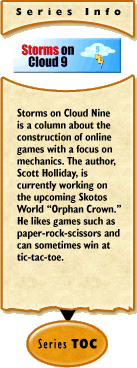 Storms on Cloud Nine #10:
Storms on Cloud Nine #10:
Balance
by Scott Holliday
May 16, 2003
Single player games have taught us all the wrong lessons. I've played my
fair share and I've had a grand time finding the best combinations or the
most effective strategies. However, in an online game, if there is an
obvious best combination or strategy, suddenly the world becomes a lot
more shallow. Assuming the game is fun, game balance is probably the
single most frustrating issue. Much like the issue of cheating, a lack of
game balance can annoy your best players to the point of leaving.
Depending on the style of your game, balance issues can take several
different forms. In a character based game, skills and classes are the
usual culprits. Another important factor to look at is equipment. Becoming
more esoteric, is there a single "best" strategy to deal with obstacles?
What about combat? If there are strategy guides, the developers should be
reading them. Admittedly, some games have none of this. Without ongoing
competition, many of these problems are solved - though keeping your
players may prove to be more difficult.
The goal of many players is to be the "best", the "most powerful", the
"most efficient", or some related combination. Because of their
competitive nature, if there is a clear advantaged build or strategy, the
majority of your players will go that way. The philosophy behind making a
balanced game is instead to provide many choices to the player, none of
which gives an easier path. This is also the basis for building a much
deeper world. If you can short-circuit the player's desire for greatness,
this opens up the possibility that they will build a character rather than
a machine.
Let's assume that we've just been put in charge of balance in an upcoming
online game. Where do we start? There are several design strategies:
- Rock/Paper/Scissors : It's older than recorded history, but it works.
Each choice is both predator and prey. Change the names and you also have
a theme. Cleric beats Mage beats Fighter beats Cleric? Personally, I like
the Oriental wheel of elements - fire, earth, metal, water, wood. The
European - air, fire, earth, water is nifty - though it has also been used
to the point of cliche. The strategy is especially useful in PVP games,
and you can achieve the same effect in PVE if the environment is able to
use the same strategies. Of course, by expanding the number of options,
you build a deeper world. My suggestion is to not have too many options,
or you lose much of the effect. Likewise, the strength of the advantage
must be carefully weighed - unless you want a game of absolutes... that'd
be interesting.
- Counters : Unfortunately, online games generally have to be more
complex than Rock/Paper/Scissors. Players want their characters to have
nifty powers and effects. This is where more problems arise, since the
developer has to weigh each power/effect individually as well as in
combination. One key here is to make sure each power has a counter. With
work, this might even be able to follow Rock/Paper/Scissors. Curse stops
teleport stops roundhouse? In any case, if one power (or piece of
equipment) becomes ubiquitous, its opposition will follow suit - resulting
in a balance. Likewise, in PVE, the environment can learn and adapt the
same way.
- Reverse flood: Even in a well-balanced game, players will still find preferred combinations. One way to counter-act this is to build a system that rewards those who choose the less common path. In other words, if 99% of players choose to play magicians, other classes receive a 99x bonus, or magicians receive a 99x penalty. The same can be done for powers/effects — and the reverse flood will help to balance things out. As an added bonus, if your players know you are using a reverse flood, they will already know to avoid the big trends.
Obviously, balancing is much easier in design than in an established game. If we "nerf" somebody, they can't complain. In an established game, players have already become accustomed to the most broken combinations and prefer the status quo. Changes must be carefully administered. Even if there is an obvious game-breaker, you can't make sudden changes! Gradual flow will cushion the fall, and it will also give the developer a reference so they don't take it too far. Other strategies, such as reverse flood, proceed constantly — they can even be automated.

